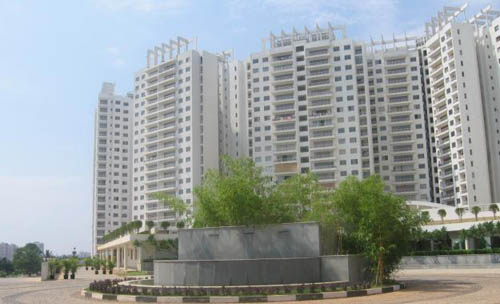By: Ravi Sinha
 Track2Realty Exclusive: The Coimbatore real estate has by and large outperformed the rest of the country. This better-than-national average performance during the year 2013 has been remarkable at a time when some of the matured property markets were witness to sales plummeting with stress both at the buyers’ as well as developers’ level.
Track2Realty Exclusive: The Coimbatore real estate has by and large outperformed the rest of the country. This better-than-national average performance during the year 2013 has been remarkable at a time when some of the matured property markets were witness to sales plummeting with stress both at the buyers’ as well as developers’ level.
What makes Coimbatore property market so bullish and, more importantly, how it is poised to shape up in 2014? The year ahead has to deal with a number of issues yet there is a general feeling that the window of opportunity to buy at a good price is between now and the next monsoon. Analysts maintain that political uncertainty will end with elections next year and with that the economy will also start to look up, hence chances of prices going up.
The property market in the city has remained relatively stable through 2013. The demand in residential market is being driven largely by the growth of IT/ITeS and flourishing textile industry. Coimbatore has already attracted potential investors from major cities such as Hyderabad, Chennai, and Bangalore due to its affordability. Salubrious climate year-round is the added draw-card. Tamil Nadu government initiatives to promote Coimbatore as a business friendly city will bode well for residential and commercial real estate segment prospects in the coming years.
Jackbastian K Nazareth, Group CEO, Purvankara believes the property market should continue to do well in the year ahead. The underlying thread of real-estate market attractiveness is accompanying social and infrastructure development. It is imperative that the elected government continues the good work of its predecessor and stays the course of planned development. It is incumbent upon the elected government to maintain political stability, progressive reforms and favourable business environment real estate and economic growth will follow.
“Despite the economic slowdown Coimbatore has gained a reputation as a preferred destination for businesses. Several multinational companies have relocated to the city, driving retail, hospitality and residential real estate sector growth. Over the next 4-5 years, Coimbatore is projected to add nearly one lakh jobs, which will fuel the city’s per capita income growth. I expect the real estate market to capitalize on the opportunity. As a significant trend, retirement homes are gaining popularity in Coimbatore owing to the pleasant weather and leisurely pace of life that the city affords. While the market is largely end-use driven (60%), the property market is attracting NRIs and investors from other parts of the country as well,” says Nazareth.
Analysts are bullish over the Coimbatore property markets maintaining that the increase in the number of IT companies and infrastructure development in Coimbatore signals upward movement of prices in residential market.
Anurag Jhanwar, Director, CRISIL Real Estate Star Ratings says the Coimbatore real estate market has been stable in 2013. The market is primarily an end-user driven one. Therefore, on one hand, there is a steady supply of property for residential demand within a reasonable price. On the other hand, however, the market is largely driven by the economic scenario, and is linked to factors like purchasing power and employment prospects.
“At a micro level, the property market will see reduced momentum until general elections is over and policymaking gets back on track. At the macro level, the cloud of economic uncertainty will continue to affect decision-making towards investments involving larger financial commitments. Being end-user driven, the momentum in the Coimbatore real estate market will largely be determined by increase in economic activity which leads to more jobs and purchasing power. Given the looming elections, the momentum is expected to be a little subdued until the first half of 2014, after which industry-friendly policies and implementation will be critical to bringing back confidence and investor interest,” says Jhanwar.
However, there are some real issues to deal with that are likely to impact real estate market in 2014. Many of the issue are inter-related and impact the economy in general as well. The idea is to take a broad view and provide a context and perspective that can assist in making informed decisions in the sector.
Though a resilient market in Coimbatore all eyes are on the General Elections in 2014 as it affects the sector in various ways. The developers in the city are apprehensive that elections may aggravate the overall slowdown in economy and delay approval processes. The prospect of an unstable government is something that the sector is apprehensive with as it would amount to all legitimate demands of the sector put on the back burner in the absence of consensus.
Regulator Bill is something that everyone within the built environment of the business, including the buyers, has been waiting for long. However, the prospect of a fractured mandate makes the future of Regulator Bill hang in balance as even if it is cleared in 2014, the lack of political consensus and centre & state imbroglio is expected to keep the regulation and reforms waiting for quite some time.
Of course, the endeavour to create a consensus over the Regulator’s jurisdiction and draconian powers would be one of the major talking points of the year ahead. The track record of developers in Coimbatore has been by and large so commitment-driven that hardly anyone is bothered about the regulator in this market.
After the Regulator Bill, Land Acquisition Bill has weathered the most resistance by the developers in 2013 and the year ahead may see some industry/political mobilisation once it becomes a law. With land being a State subject and the election year expected to bring around political uncertainty the developers with deep pockets may get into land purchase before the new legislation is in place. This has not been the trend in Coimbatore market thus far.
The new RBI Governor has made it clear that he intends to tame the inflation and check the slide of Indian currency than infuse excess liquidity in the market and appease the home buyers and the developers. The year ahead promises to have no change in this stance and the sector will have reasons to feel the heat before every quarterly monetary policy review by the RBI. Unless there is a new Government with strong intentions to safeguard the interests of real estate, there seem to be no respite for the sector; chances of which are very less.
One strong hope of the sector is the SEBI’s endeavour to revive the Real Estate Investment Trust (REIT). When the banks are not willing to lend to the sector, PE funds deserting and capital market pretty uncertain, REIT is the only silver lining for the cloudy financial weather of the developers.
The optimism also stems from the fact that even the big-ticket private equity players who want to invest in the Indian realty but are apprehensive of opaque market are now planning to set up REIT. This is also good news for the retail investors since the real estate continues to be an attractive investment instrument, even for those who can not afford to buy properties.
FDI in retail was supposed to be a game changer for the commercial real estate, but has hardly made any difference in 2013. The government provided the much awaited clarity on 50 per cent investments to be made in the back-end infrastructure from the FDI being brought in by international multi-brand retailers.
Analysts maintain once macro-economy stabilises and new government is in office, this may spur international retailers who were keen on operating in India, but were looking to understand the restrictions imposed by the government on their investments and operations.





